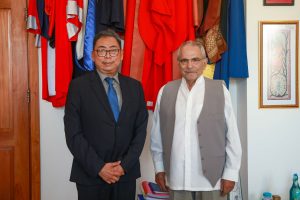Myanmar’s military government has ordered Timor-Leste’s senior diplomat to leave the country in retaliation for a meeting that his government held with the opposition National Unity Government (NUG).
On Sunday, the junta’s Ministry of Foreign Affairs said that it had informed the charge d’affaires of the country’s embassy in Yangon on Friday to leave the country no later than September 1.
“Such irresponsible actions of the government of Timor-Leste are not only harming the bilateral diplomatic relations between the two countries but also encouraging the terrorist group to further committing their violations in Myanmar,” the Foreign Ministry said, according to The Associated Press.
Myanmar has been in a state of crisis since the military seized power in February 2021, which was followed by widespread protests which, after their violent suppression by the military, later coalesced into a broad-based armed struggle against the junta.
Politicians from Timor-Leste, by some measures the most democratic country in Southeast Asia, have been relatively outspoken in both their criticisms of the military administration and their support for its opponents. Early last month, President Jose Ramos-Horta met the NUG’s Foreign Minister Zin Mar Aung, who said that the pair “exchanged ideas and thoughts on what is currently happening in Myanmar.” She added that Ramos-Horta had “show[ed] his support for our struggle and how we can work together to address those issues.”
Last week, Aung Myo Min, the NUG’s human rights minister, opened a human rights training program in Dili, the capital of Timor-Leste, where he met with Ramos-Horta – the meeting that seemingly prompted Naypyidaw’s expulsion order.
Timor-Leste has applied to become the eleventh member of the Association of Southeast Asian Nations (ASEAN), but the crisis in Myanmar threatens to delay or derail its accession to the regional bloc. In a speech earlier this month, Prime Minister Xanana Gusmão announced that his government could not accept military junta regimes anywhere, nor ignore the scale of human rights violations in Myanmar.
“East Timor will not be joining ASEAN, if ASEAN cannot convince the military junta in Myanmar” to end the conflict, Gusmão said.
In response to the junta’s order of expulsion, Timor-Leste’s government said in a statement late Saturday that it “reiterates the importance of supporting all efforts for the return of democratic order in Myanmar and expresses its solidarity with the people of Myanmar, while urging the Military Junta to respect human rights and seek a peaceful and constructive solution to the crisis.”
For its own part, the NUG declared that the military junta was an “illegal organization” that did not have the authority to order the expulsion, and praised Dili’s support for its struggle.
“We deeply respect and appreciate the position of Timor-Leste that values fundamental democratic policies and standards, the rule of law and human dignity,” it stated. “This stands as an exemplary model for others to follow.”
The charge d’affaires is believed to be the first foreign diplomat expelled from Myanmar since the coup, which is somewhat surprising, given the international condemnation that the military junta has faced, and the range of sanctions that have been imposed against it. However, this is clearly a case of the junta making an example of the small nation in a way that it is not yet willing to do in the case of the larger nations, like the United States, Canada, or the United Kingdom.
Above all, it stands as a warning to the more outspoken members of ASEAN, such as Indonesia and Malaysia, to steer away from any engagement with the “terrorists” in the NUG, lest they too find themselves declared persona non grata.

































